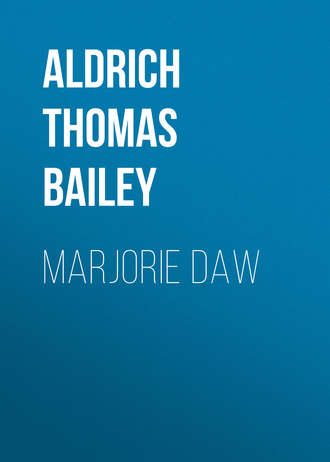
Aldrich Thomas Bailey
Marjorie Daw
XI
EDWARD DELANY TO JOHN FLEMMING
August 29, 1972.
I write in great haste to tell you what has taken place here since my letter of last night. I am in the utmost perplexity. Only one thing is plain—you must not dream of coming to The Pines. Marjorie has told her father everything! I saw her for a few minutes, an hour ago, in the garden; and, as near as I could gather from her confused statement, the facts are these: Lieutenant Bradly—that’s the naval officer stationed at Rivermouth—has been paying court to Miss Daw for some time past, but not so much to her liking as to that of the colonel, who it seems is an old fiend of the young gentleman’s father. Yesterday (I knew she was in some trouble when she drove up to our gate) the colonel spoke to Marjorie of Bradly—urged his suit, I infer. Marjorie expressed her dislike for the lieutenant with characteristic frankness, and finally confessed to her father—well, I really do not know what she confessed. It must have been the vaguest of confessions, and must have sufficiently puzzled the colonel. At any rate, it exasperated him. I suppose I am implicated in the matter, and that the colonel feels bitterly towards me. I do not see why: I have carried no messages between you and Miss Daw; I have behaved with the greatest discretion. I can find no flaw anywhere in my proceeding. I do not see that anybody has done anything—except the colonel himself.
It is probable, nevertheless, that the friendly relations between the two houses will be broken off. “A plague o’ both your houses,” say you. I will keep you informed, as well as I can, of what occurs over the way. We shall remain here until the second week in September. Stay where you are, or, at all events, do not dream of joining me....Colonel Daw is sitting on the piazza looking rather wicked. I have not seen Marjorie since I parted with her in the garden.
XII
EDWARD DELANEY TO THOMAS DILLON, M.D., MADISON SQUARE, NEW YORK
August 30, 1872.
My Dear Doctor: If you have any influence over Flemming, I beg of you to exert it to prevent his coming to this place at present. There are circumstances, which I will explain to you before long, that make it of the first importance that he should not come into this neighborhood. His appearance here, I speak advisedly, would be disastrous to him. In urging him to remain in New York, or to go to some inland resort, you will be doing him and me a real service. Of course you will not mention my name in this connection. You know me well enough, my dear doctor, to be assured that, in begging your secret cooperation, I have reasons that will meet your entire approval when they are made plain to you. We shall return to town on the 15th of next month, and my first duty will be to present myself at your hospitable door and satisfy your curiosity, if I have excited it. My father, I am glad to state, has so greatly improved that he can no longer be regarded as an invalid. With great esteem, I am, etc., etc.
XIII
EDWARD DELANEY TO JOHN FLEMMING
August 31, 1872.
Your letter, announcing your mad determination to come here, has just reached me. I beseech you to reflect a moment. The step would be fatal to your interests and hers. You would furnish just cause for irritation to R. W. D.; and, though he loves Marjorie devotedly, he is capable of going to any lengths if opposed. You would not like, I am convinced, to be the means of causing him to treat her with severity. That would be the result of your presence at The Pines at this juncture. I am annoyed to be obliged to point out these things to you. We are on very delicate ground, Jack; the situation is critical, and the slightest mistake in a move would cost us the game. If you consider it worth the winning, be patient. Trust a little to my sagacity. Wait and see what happens. Moreover, I understand from Dillon that you are in no condition to take so long a journey. He thinks the air of the coast would be the worst thing possible for you; that you ought to go inland, if anywhere. Be advised by me. Be advised by Dillon.
XIV
TELEGRAMS. September 1, 1872
1.—TO EDWARD DELANEY.
Letter received. Dillon be hanged. I think I ought to be on the ground. J. F.
2.—TO JOHN FLEMMING.
Stay where you are. You would only complicated matters. Do not move until you hear from me. E. D.
3.—TO EDWARD DELANEY.
My being at The Pines could be kept secret. I must see her. J. F.
4.—TO JOHN FLEMMING.
Do not think of it. It would be useless. R. W. D. has locked M. in her room. You would not be able to effect and interview. E. D.
5.—TO EDWARD DELANEY.
Locked her in her room. Good God. That settles the question. I shall leave by the twelve-fifteen express. J. F.
XV
THE ARRIVAL
On the second day of September, 1872, as the down express, due at 3.40, left the station at Hampton, a young man, leaning on the shoulder of a servant, whom he addressed as Watkins, stepped from the platform into a hack, and requested to be driven to “The Pines.” On arriving at the gate of a modest farm-house, a few miles from the station, the young man descended with difficulty from the carriage, and, casting a hasty glance across the road, seemed much impressed by some peculiarity in the landscape. Again leaning on the shoulder of the person Watkins, he walked to the door of the farm-house and inquired for Mr. Edward Delaney. He was informed by the aged man who answered his knock, that Mr. Edward Delaney had gone to Boston the day before, but that Mr. Jonas Delaney was within. This information did not appear satisfactory to the stranger, who inquired if Mr. Edward Delaney had left any message for Mr. John Flemming. There was a letter for Mr. Flemming if he were that person. After a brief absence the aged man reappeared with a Letter.







